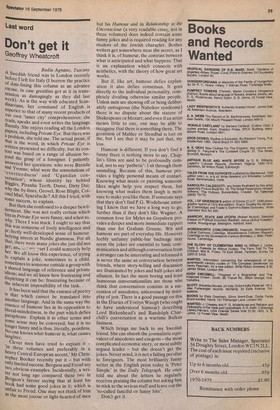Last word
Don't get it
Geoffrey Wheatcroft
Badia Agnano, Tuscany A Swedish friend was in London recently before I left for Italy (I borrow the practice Of date-lining this column as an advance excuse, in case gremlins get at it in trans!mission as damagingly as they did last Wlek). As is the way with educated Scanutilavtans, her command of English is superior to that of many recent products of our own 'inner city' comprehensives: she reads, speaks and even writes the language fluently. She enjoys reading all the London papers, including Private Eye. But there was a problem, she told me. The actual prose, if that is the word, in which Private Eye is written presented no difficulty, but its content was based on a range of allusion beyond the grasp of a foreigner. I patiently answered her questions: who were Brenda and Yvonne; what were the connotations of `overtiredness and 'Ugandan conversation'; whose identity lay behind Biggles, Piranha Teeth, Dame, Dirty Dai; Why the by-lines, Grovel, Rose Blight, Colonel Mad, Sparafucile? All this I tried, with some success, to explain. But then she confessed to a deeper bewilderment. She was not really certain which bits in Private Eye were funny, and when so, Why. There I was stuck. I ought to say that this was someone of lively intelligence and Prifectly well-developed sense of humour, belying sneers at Nordic glumness. For all that, there were many jokes she just did not get; an -art I could scarecely help her. We all know this experience, of trying to explain a joke, sometimes to a child, sometimes to someone outside a group with a shared language of reference and private idiom; and we all know how frustrating and dispiriting it can be: frustrating because of the inherent impossibility of the task. It has been said that the essence of poetry IS that which cannot be translated into another language. And in the same way the essence of humour lies in its opposition to literal-mindedness, in the part which defies Paraphrase. Explain it in other terms and sortie sense may be conveyed, but it is no longer funny and is thus, literally, pointless. No one knows what humour is, what causes laughter.
Clever men have tried to explain it 'in three volumes and preferably in a heavy Central European accent,' Mr Christopher Booker recently put it but with only limited success. Bergson and Freud are two obvious examples. Incidentally, a writer not long ago compared these two in Bergson's favour saying that at least his book had some good jokes in it; which is unfair to Freud. One may not think of him as the most jocose or light-hearted of men but his Humour and its Relationship to the Unconscious (a very readable essay, not in three volumes) does indeed contain some funny jokes and is required reading for any student of the Jewish character. Bother writers get somewhere near the secret, as I think it is, of humour, the contrast between what is anticipated and what happens. That is an explanation which connects with aesthetics, with the theory of how great art works.
But if, like art, humour defies explanation it also defies consensus. It goes directly to the individual personality, completely dividing otherwise similar people. Unless men are showing off or being deliberately outrageous (the Nabokov syndrome) there is no dispute about the stature of Shakespeare or Mozart; and even if an artist means little to one, one may be able to recognise that there is something there. The greatness of Mahler or Stendhal is lost on me, but I see that it may be just that, my loss.
Humour is different. If you don't find it funny there is nothing more to say. Chaplin's films are said to be profoundly comical, not to say 'pathetic': I sit through them unsmiling. Because of this, humour provides a highly personal means of contact. Knowing what music or painting someone likes might help you respect them, but knowing what makes them laugh is more sure to make you like them. If someone says that they don't find P.G. Wodehouse amusing I know that we have a long way to go, further than if they don't like Wagner. A common love for Myles na Gopaleen provides a deeper and more immediate rapport than one for Graham Greene. Wit and humour are part of everyday life. However feebly unfunny public-bar badinage may seem the jokes are essential to basic communication and although conversation from a stranger can be interesting and informed it is never the same as conversation between friends, where story-telling and discussion are illuminated by jokes and half-jokes and allusion. In fact the most boring and least humorous conversationalists are those who think that conversation consists in a succession of anecdotes, unleavened by interplay of jest. There is a good passage on this in the Diaries of Evelyn Waugh (who ought to have understood humour) describing Lord Birkenhead's and Randolph Churchill's conversation in a wartime Balkan fastness.
Which brings me back to my Swedish friend. She can absorb the journalistic equivalent of anecdotes and exegesis the most complicated economic story, or most subtly argued leader but she doesn't get the jokes. Never mind, it is not a failing peculiar to foreigners. The most brilliantly funny writer in the English press today is 'Peter Simple' in the Daily Telegraph. He once told me about the letters he regularly receives praising the column but asking him to stick to the serious stuff and leave out the 'so-called fanciful or funny bits'.
Don:t get it.


































 Previous page
Previous page